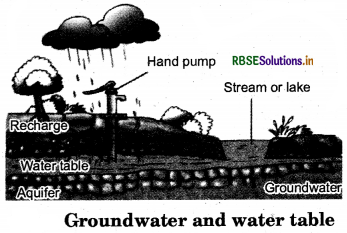RBSE Solutions for Class 7 Science Chapter 16 Water: A Precious Resource
Rajasthan Board RBSE Solutions for Class 7 Science Chapter 16 Water: A Precious Resource Textbook Exercise Questions and Answers.
RBSE Class 7 Science Solutions Chapter 16 Water: A Precious Resource
RBSE Class 7 Science Water: A Precious Resource InText Questions and Answers
Page 195
Question 1.
Boojho wondered about the alarmingly small quantity of water available for our use.
Answer:
Only 0.006% of all the water on Earth is available for our use. It is quite alarming.

Page 197
Question 2.
Women have to perform a number of household chores. If they have also to spend time to fetch water it adds to their burden.
Answer:
Yes, this is because villages don’t have a civic system like the bigger cities that can supply water to individual homes directly from the source.
RBSE Class 7 Science Water: A Precious Resource Textbook Questions and Answers
Question 1.
Mark ‘T’ if the statement is true and ‘F’ if it is false:
(a) The freshwater stored in the ground is much more than that present in the rivers and lakes of the world. (T/F)
(b) Water shortage is a problem faced only by people living in rural areas. (T/F)
(c) Water from river is the only source for irrigation in the fields. (T/F)
(d) Rain is the ultimate source of water. (T/F)
Answer:
(a) True
(b) False
(c) False
(d) True.
Question 2.
Explain how groundwater is recharged?
Answer:
Groundwater is recharged by the process of infiltration. Infiltration is the process of seepage of rain water or water from nearby lake or pond into the soil, filling up the spaces or pores between soil particles and cracks below the ground.
Question 3.
There are ten tubewells in a lane of fifty houses. What could be the long term impact on the water table?
Answer:
The high number of tubewells in any. area will result in depletion of the underground water. With time, the water table will go deeper and deeper till the aquifers run dry, unless it is replenished by sufficient infiltration.
Question 4.
You have been asked to maintain a garden. How will you minimize the use of water?
Answer:
Water use can be minimised by:
- Checking for repairing any leakages in the delivery pipe.
- Practising drip irrigation for watering the plants.
- Install a rainwater harvesting system.
Question 5.
Explain the factors responsible for the depletion of water table.
Answer:
Following factors contribute to the depletion of the water table:
1. Increasing population: Increasing population creates demand for construction of houses, shops, offices, roads and pavements. This decreases the open areas like parks and playgrounds. This in turn decreases seepage of rainwater into ground.
Moreover a huge amount of water is required for construction work. On the other hand, we are consuming more groundwater and allowing lesser water to seep into the ground. This results in depletion of water table.
2. Increasing industries: The number of industries is increasing continuously. Water used by most of the industries is drawn from ground.
3. Agricultural activities: Population pressure on agriculture forces increasing use of groundwater day by day. This results in depletion of water table.
Question 6.
Fill in the blanks with the appropriate answers:
(a) People obtain groundwater through ......................... and .........................
(b) Three forms of water are ........................., ......................... and .........................
(c) The water bearing layer of the Earth is .........................
(d) The process of water seepage into the ground is called .........................
Answer:
(a) tubewells, handpump
(b) solid, liquid, gas
(c) aquifer
(d) infiltration.
Question 7.
Which one of the followingis hot responsible for water shortage?
(i) Rapid growth of industries
(ii) Increasing population
(iii) Heavy rainfall
(iv) Mismanagement of water resources
Answer:
(iii) Heavy rainfall.

Question 8.
Choose the correct option. The total water:
(i) in the lakes and river of the world remains constant.
(ii) under the ground remains constant.
(iii) in the seas and oceans of the world remains constant.
(iv) of the world remains constant.
Answer:
(iv) of the world remains constant.
Question 9.
Make a sketch showing groundwater and water table. Label it.
Answer:

